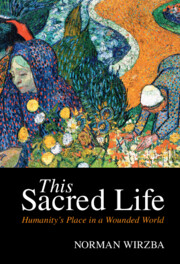Book contents
- This Sacred Life
- Reviews
- This Sacred Life
- Copyright page
- Dedication
- Epigraph
- Contents
- Preface
- Acknowledgments
- Part I Assessing Our Situation
- Part II Turning to Fundamentals
- Part III This Sacred Life
- 5 Why Sacred Anything?
- 6 The Logic of Creation
- 7 Creaturely Humanity
- 8 Called to Creativity
- Author Index
- Scripture Index
- Subject Index
7 - Creaturely Humanity
from Part III - This Sacred Life
Published online by Cambridge University Press: 08 October 2021
- This Sacred Life
- Reviews
- This Sacred Life
- Copyright page
- Dedication
- Epigraph
- Contents
- Preface
- Acknowledgments
- Part I Assessing Our Situation
- Part II Turning to Fundamentals
- Part III This Sacred Life
- 5 Why Sacred Anything?
- 6 The Logic of Creation
- 7 Creaturely Humanity
- 8 Called to Creativity
- Author Index
- Scripture Index
- Subject Index
Summary
To say that human beings are creatures is to say that they are finite, fallible, and defined by their need of others to nurture and support them. It is to understand that people must learn to receive and then share again the life that they have been given. This places people in positions of vulnerability that are often hard to bear. This chapter explores the contours of creatureliness, and examines the character of our interdependence while also describing the communal conditions that are necessary if the vulnerability of people is to be honored rather than violated. Put another way, to live into our creaturely condition it is important for people to exercise forms of power that are modelled on the love of God made incarnate in Jesus. Characterized this way, creatureliness is humanity’s way of participating in the divine love that creates and sustains all of life.
Keywords
Information
- Type
- Chapter
- Information
- This Sacred LifeHumanity's Place in a Wounded World, pp. 176 - 211Publisher: Cambridge University PressPrint publication year: 2021
